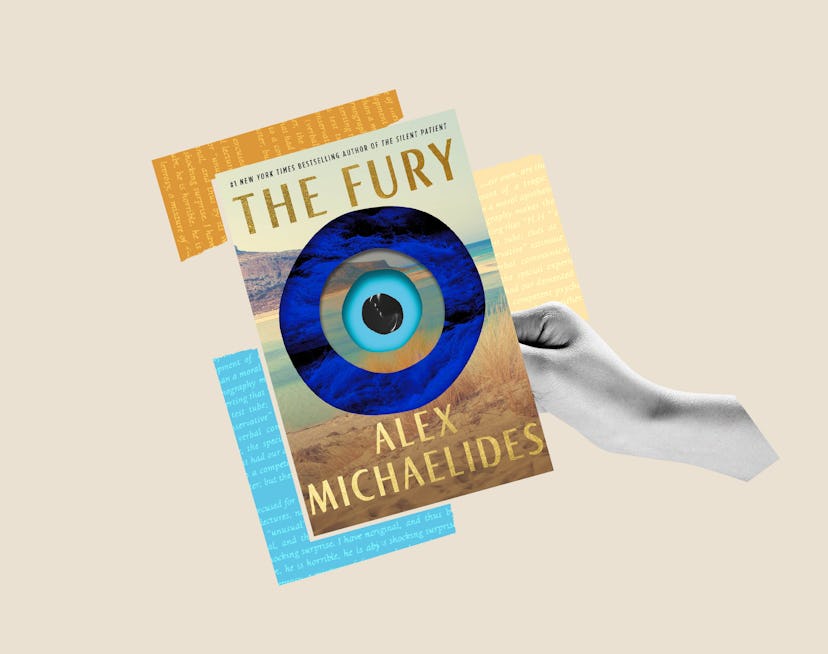Bustle Book Club
With The Fury, Alex Michaelides Learned To Let Go
The celebrated author of The Silent Patient and The Maidens found a new way of working.

Writers will often divide themselves between two categories: plotters, who meticulously outline every beat; and pantsers, who sit down to write and see where their imagination takes them. For a long time, Alex Michaelides was squarely in the former camp. “I'm usually very, very controlled. I plan everything,” he tells Bustle. With his latest novel, though, Michaelides had a sudden conversion. “I let [The Fury narrator] Elliot tell me the story,” he says. “I've never had someone come alive to that degree. I was just tapping away, and it was all appearing. It was joyful, to allow yourself to submit to it, and not be afraid.”
The resulting book is a dazzling whodunit, much like his bestselling novels The Silent Patient and The Maidens. But The Fury sets itself apart by adding dose of Old Hollywood glamour and intrigue — fitting, for an author who began his career in screenwriting. The story, about a reclusive ex-movie star who invites her closest friends and family to her Greek private island for Easter, only to have a murder occur, reads like the love child between Sunset Boulevard’s Billy Wilder and Agatha Christie. “It made me feel like a proper writer for the first time — combining a sexy story with characters who are real, and deep, and meaningful,” Michaelides says.
The experience has also changed Michaelides’ approach to writing across the board, allowing himself to trust his gut and take more creative risks. “I just spontaneously wrote a play by hand over two weeks, and I just loved it,” he says. “I don't know if it's a good play, but it's the first one I've ever written, and it’s all because I’m allowing myself to play again.”
Below, Michaelides reflects on writing in his kitchen, the advice he got at the American Film Institute, and the Old Hollywood biography he’s currently reading.
On the dual biography he’s reading now:
I’m reading Erotic Vagrancy about Richard Burton and Elizabeth Taylor's spending habits. It’s a great book that took the author, Roger Lewis, longer to write than they were ever together. And it's not just about their marriage: It's about what they ordered in the restaurants and where they stayed on holiday.
On writing in a heightened head space:
When I write I drink coffee, smoke weed, and don't eat. Then I cook myself a huge meal at the end. I think it's good to be in a slightly heightened state when you write because it's about freeing the right brain and just being creative. Then, when I edit, it's a whole different story. When I was in the American Film Institute, they always said, "Don't edit and write on the same day, because one cancels the other out.” So I've always stuck to that. I'll get very creative and free in my writing and then when I edit, I print it out, sit down, go through it, and I’m very serious.
On making the most of a genre:
Ruth Rendell is my favorite crime writer and she said a quote that I love. She said she just wanted to be a writer, and it just happened that her first published book was a crime book, so she got stuck in that. I think people like that are more interesting. I always felt like I wanted to be a writer but when I was young, I didn't have anything to say. I would write a plot but it was just really shallow. Then I had a lot of therapy and a lot of learning and now I feel like I’ve got something to communicate [with storytelling]. Otherwise, you're just selling just cheap thriller plots.
On his go-to writing spot:
I can only write at the kitchen table because as a kid I would do my homework there. My mother would always be busy feeding the dogs or cleaning, but when I would read her an English essay, she would stop what she was doing and listen. It gave me such joy and writing at the kitchen table somehow brings that back.
On the soundtrack he can never listen to again:
I will choose one album to listen to for each book, and they're always classical. I will listen to the same album on repeat for three hours while I write again, and again, and again, and again for a year. For The Fury it was the Philip Glass soundtrack to The Hours. But now if I ever listen to it again, I'm going to be violently ill.
This interview has been edited and condensed for clarity.
This article was originally published on